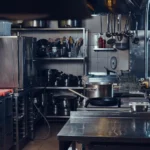Designing the Perfect Commercial Kitchen in Nigeria

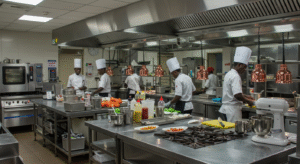
A picture illustrating an efficient restaurant kitchen layout.
Every thriving food business, whether it’s a restaurant, hotel, catering outfit, bakery, or quick-service kitchen, runs on one thing:
It’s easy to think a commercial kitchen is all about aesthetics, but the truth is far from it. The true power of a kitchen lies in its ability to deliver *efficiency, safety, and durability*, while meeting the unique demands of each operation. The right kitchen setup can be the difference between profit and loss, smooth service and chaos, or growth and stagnation.
So, what exactly makes a *perfect commercial kitchen* in the food industry?
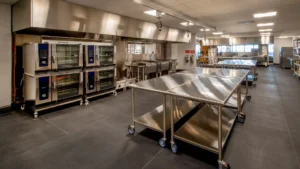
A commercial kitchen
- Smooth Workflow & Layout
The design of your kitchen should allow your team to move *swiftly and seamlessly*. Strategic placement of cooking stations, prep areas, and washing zones reduces unnecessary movement, speeds up food preparation, and saves valuable time especially during peak hours. A well-designed layout directly translates into faster service and higher customer satisfaction
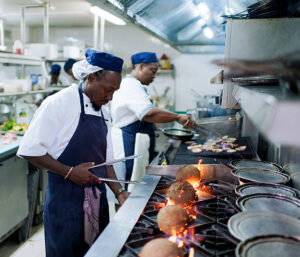
Portrait of chefs working in a commercial kitchen.
2. Heavy-Duty Work Tables
At the heart of every commercial kitchen is the work table. Investing in *stainless steel work tables* ensures durability, hygiene, and ease of cleaning. Unlike wood or cheaper alternatives, stainless steel tables withstand years of heavy use, resist corrosion, and meet health standards required for food preparation.
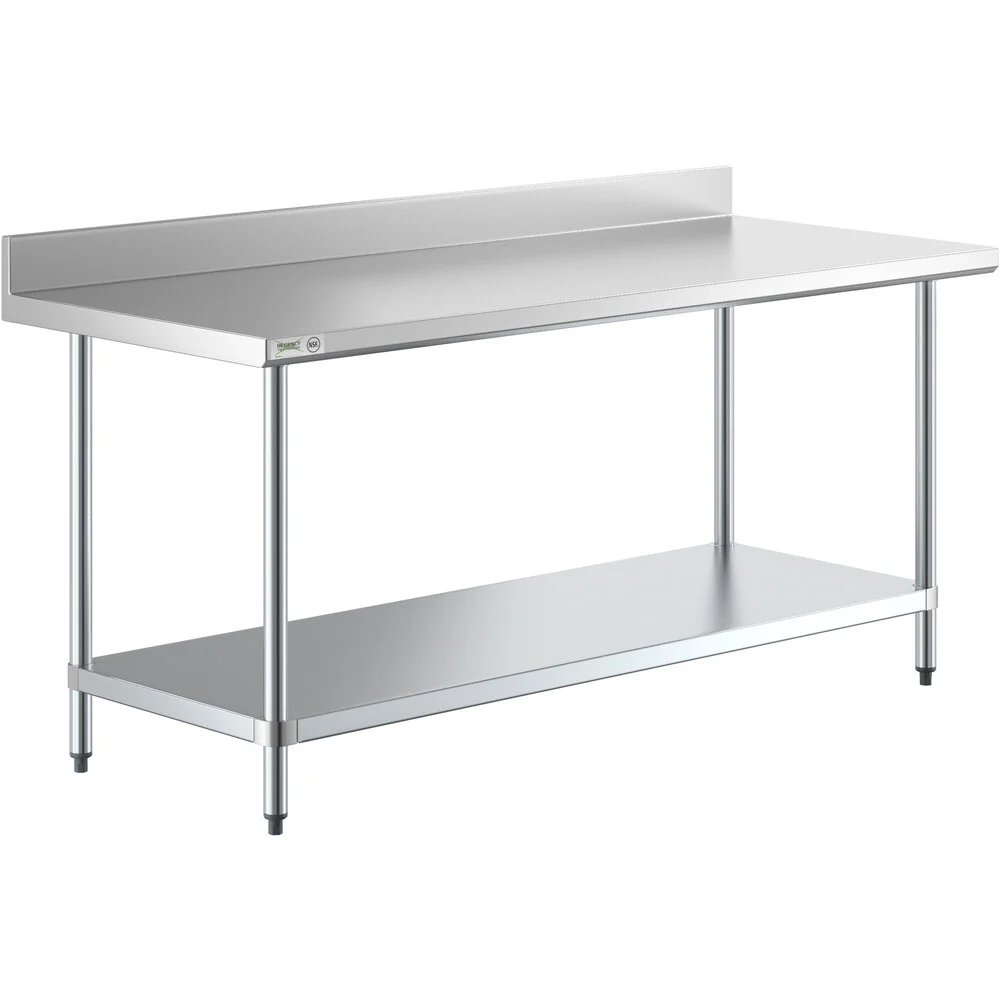
stainless steel work table
3. High-Performance Cooking Range & Burners
Whether you’re cooking soups, grilling, or frying in bulk, you need a *reliable cooking range* with burners that distribute consistent heat. In a commercial kitchen where timing and quality are everything, professional-grade stoves guarantee speed, precision, and durability.
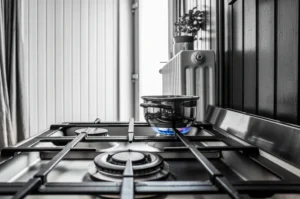
reliable cooking range
- Industrial Ovens
From bakeries turning out fresh bread to hotels catering for hundreds, *industrial ovens* are non-negotiable. Convection ovens ensure even cooking for pastries, snacks, and meats, while deck ovens are essential for large-scale baking operations. A great oven saves time, reduces waste, and ensures consistency.
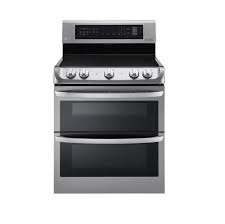
An electric oven
5. Refrigeration & Cold Storage
Keeping ingredients fresh is non-negotiable in food service. *Commercial-grade refrigerators and freezers* help maintain freshness, prevent spoilage, and ensure compliance with food safety standards. Whether it’s storing vegetables, dairy, or proteins, reliable cold storage is a silent backbone of every successful kitchen.
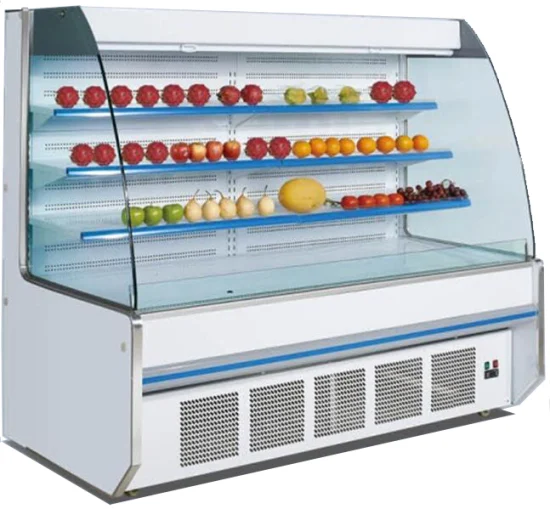
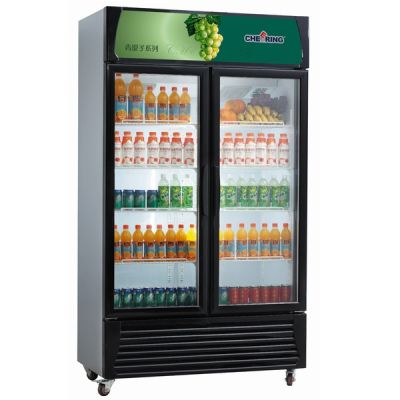
6. Mixers & Food Processors
For businesses handling large batches—whether dough, sauces, or batters—*industrial mixers and processors* cut down manual labor while increasing efficiency. Bakers, caterers, and quick-service kitchens rely on these machines to maintain speed and consistency in production.
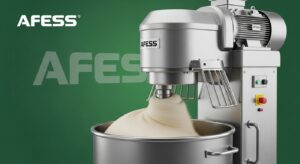
An industrial mixer, a key 2025 kitchen trend for scaling food production and ensuring consistency.
- Dishwashing & Sanitation Area
Hygiene is not optional. A proper *dishwashing section* with deep industrial sinks or dishwashers keeps utensils, cookware, and serving dishes clean, ensuring smooth rotation between use. This setup not only boosts efficiency but also keeps your kitchen compliant with hygiene regulations.
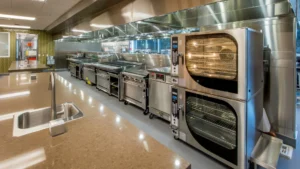
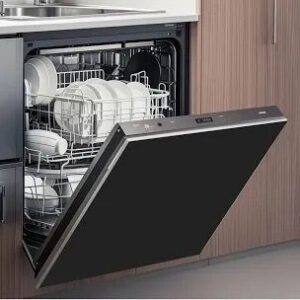
- Ventilation & Cooling Systems
Commercial kitchens get hot—very hot. Without proper *ventilation, hoods, and exhaust systems*, staff productivity can drop, safety risks increase, and the working environment becomes unbearable. A well-ventilated kitchen stays cool, safe, and comfortable, allowing your team to focus on what matters—delivering great food.

A picture illustrating an efficient restaurant kitchen layout.
- Organized Storage Solutions
From shelves and racks to dry storage cabinets, a kitchen thrives on organization. Proper *storage systems* make utensils, equipment, and ingredients easy to find, reduce clutter, and improve workflow. An organized kitchen is a faster, safer, and more professional kitchen.
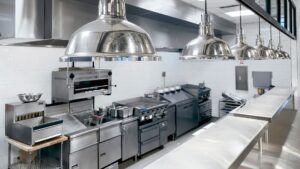
Kitchen Equipment Store
- Safety First
Every commercial kitchen must prioritize safety. This includes:
* Fire extinguishers in easily accessible points.
* Non-slip flooring to prevent accidents.
* First aid kits and proper lighting.
* Compliance with food safety and health standards.
A safe kitchen protects both staff and customers, while reducing liability for the business owner.
11. Waste Management
Efficient kitchens generate waste ,but smart kitchens *manage it well*. Proper disposal systems, waste bins, and recycling solutions ensure cleanliness, reduce health hazards, and create a more sustainable operation.

Why This Matters for Food Businesses
In Nigeria’s fast-growing food industry, competition is fierce. Customers expect not just great food, but *speed, hygiene, and consistency*. A well-structured kitchen empowers your team to deliver excellence, reduce downtime, and scale operations smoothly.
At the end of the day, designing a commercial kitchen is about balancing *functionality, safety, and cost-effectiveness*. With Afess Nigeria’s durable, high-performance equipment, you can build a kitchen that powers growth, enhances efficiency, and gives your business the professional edge it deserves.
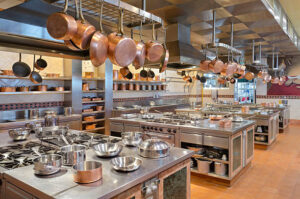
Ready to set up your dream kitchen? [Visit Afess ](https://afess.ng/) today and discover the equipment trusted by top chefs and business owners.
